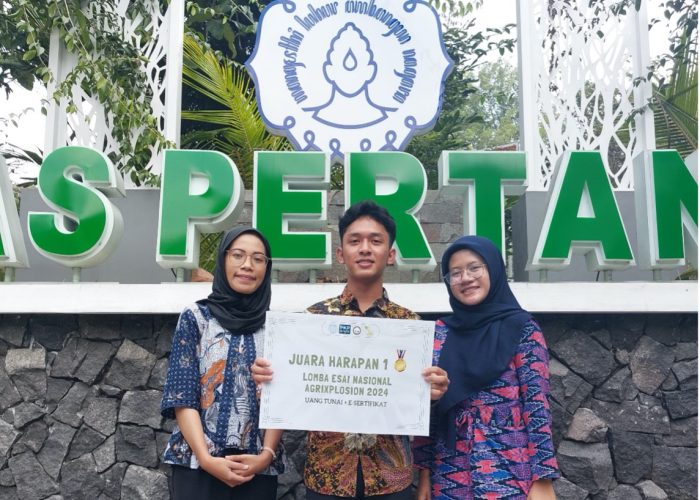A team of undergraduate students from the Faculty of Biology, Universitas Gadjah Mada, class of 2022, led by Azra Belva Naprilian, along with Kotimah and Ridho Nur Alam, won 1st Runner-Up in the essay competition AGRIXPLOSION organized by the Faculty of Agriculture, Universitas Sebelas Maret Surakarta (UNS). The competition, sponsored by Pertamina, revolved around the theme “Implementing Innovation to Reach Net Zero Emission for a Sustainable Future” featured participants from various universities across Indonesia. The competition included several stages: administration and essay submission, followed by an online presentation on Sunday, June 30, 2024.
In this competition, the biology team presented an essay titled “Utilization of Biofertilizer and Spirulina sp. as Micro-remediators in the Conservation Efforts of Acacia mangium Forests in Post-Tin Mining Ecosystems in Bangka Belitung,” under the guidance of Tyas Ikhsan Hikmawan, M.Sc., Ph.D. This innovation addresses the environmental damage caused in Bangka Belitung, the largest tin-producing region, where natural resource exploitation without maintenance efforts has led to ecosystem pollution. The essay proposed a biofertilizer formula combining various microbes capable of micro-remediation of post-mining land. Additionally, the innovation included using a combination of biofertilizer and Spirulina sp. to enhance biofertilizer as a supplementary nutrient provider for microorganisms within it.
Reclamation of post-tin mining land in Bangka Belitung is a crucial step in addressing ecosystem damage caused by mining activities. The combination of micro-remediators and the utilization of microalgae Spirulina sp. can effectively remediate heavy metals. Moreover, biofertilizers can restore essential nutrients and improve soil structure. The planting of Acacia mangium as a phytoremediator has also proven effective in restoring the balance of ecosystems in former mining lands, given its adaptability to heavy metal-contaminated soils. This innovation is expected to minimize the negative impacts of mining and support forest conservation and environmental sustainability in the region. This strategy aligns with The Sustainable Development Goals (SDGs) point 15, related to sustainable management of post-mining land, ensuring ecological recovery, and soil productivity for the future.
[Authors: Azra Belva Naprilian and Kotimah]



